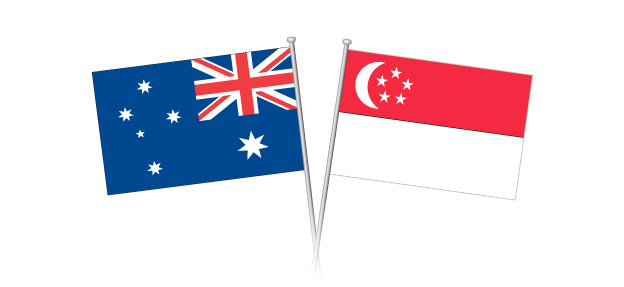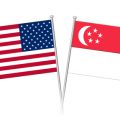In this comparative report, we look at the differences between doing business in Singapore and Australia.
This report refers to data from World Bank’s 2014 ‘Ease of Doing Business’ report and World Economic Forum’s Global Competitiveness 2013 – 2014 as well as 2014 Global Enabling Trade reports. It measures five indicators, namely company incorporation, corporate tax rate, foreign investment friendliness, intellectual property protection and workforce.
Overview
According to an article in Australia’s Business Spectator titled “Is Australia now the most boring place to do business,” 42.2% of the country’s 770,000 businesses are engaging in some form of innovative activity.
However, the proportion of firms innovating has stagnated when compared to the rate of business growth. The report added that the OECD saw Australia as having ingredients for innovation namely strong capital market and market competition, a vibrant research culture and workforce. However, it lacked seed capital for start-ups and collaboration between key players.
This is in addition to the other factors cited as most problematic for doing business in Australia in the GCR. They include inefficient government bureaucracy, tax rates and tax regulations.
Both Singapore and Australia are among the best places in the world to do business. However, there are some challenges to doing business from Australia, partly due to these issues and its geographic isolation.
| World Bank’s Doing Business (DB) 2014 Singapore vs. Australia |
||
| Rank | ||
| Measure | Singapore | Australia |
| Overall ranking | 1 | 11 |
| Starting a business | 3 | 4 |
| Dealing with construction permits | 3 | 10 |
| Getting electricity | 6 | 34 |
| Registering property | 28 | 40 |
| Getting credit | 3 | 3 |
| Protecting investors | 2 | 68 |
| Paying taxes | 5 | 44 |
| Trading across borders | 1 | 46 |
| Enforcing contracts | 12 | 14 |
| Resolving insolvency | 4 | 18 |
Company Incorporation
In terms of ease of starting a business, both Singapore and Australia make it easy for companies. According to the Doing Business Report, Singapore was ranked 3rd while Australia came in 4th worldwide.
In both countries, it takes 3 procedures over 2.5 days to start a business. However, Singapore was ranked better in this category because it costs a more to complete this process in Australia (AUD 433). In Singapore, starting a business would cost S$385.
In addition, dealing with construction permits is faster in Singapore than in Australia. According to the Doing Business report, it takes 11 procedures to build a warehouse in either country. However, the process takes 26 days in Singapore and 112 days in Australia.
Read More » Doing Business in Australia or Singapore
Corporate taxation
The Doing Business report has ranked Australia 44th worldwide in the category of paying taxes. This represents an improvement from its 49th position in the 2013 report. On the other hand, Singapore maintained its 5th position year on year, due to its tax rates and filing procedures.
The marginal corporate tax rate in Singapore is 17%. This is lower than Australia’s by 13%. For more details on tax rates in Singapore, please visit our page on Singapore taxation.
Singapore offers special corporate tax rates for resident companies but Australia’s corporate rate (30%) applies to resident and non-resident companies. Furthermore, resident companies are liable to tax on its worldwide income and capital gains. Non-resident companies in Australia need to pay corporate tax on Australian-sourced income as well as capital gains on the disposal of a taxable Australian real property (TARP).
In addition, businesses in Australia make 11 payments a year and spend 105 hours a year filing, preparing and paying taxes. In contrast, businesses in Singapore make five tax payments a year and spend 82 hours a year preparing, filing and paying taxes.
Foreign investment friendliness
In order to encourage investors to inject capital into businesses, countries must have regulations to protect them. In the Doing Business report, the Strength of Investor Protection Index measures the transparency of transactions, the shareholders’ ability to sue officers and directors for misconduct and liability for self-dealing. Singapore scored 9.3 out of 10 while Australia scored 5.7, in part due to a low score in the director liability sub-index. This places Singapore in the 2nd position and Australia 68th in the category of protecting investors.
In addition, cross-border investments are supported by sound trade policies and inter-regional trade agreements. According to the 2014 Global Enabling Trade report, Singapore was ranked the top position due to its high scores in terms of border administration, infrastructure, operating environment and market accessibility. Australia was ranked at the 23rd place.
Furthermore, Singapore is placing greater focus on higher standards of financial reporting and investor protection to avoid tax evasion and financial crimes. An emphasis on compliance with regulations like FATCA and BASEL III will continue to ensure wealth protection for genuine investors.
Intellectual property protection
Other than foreign investment friendliness, protection of Intellectual Property (IP) rights helps boost investor confidence. According to the Global Competitiveness Report (GCR), Singapore stands second in the world and first in Asia for having the best IP protection. The Political & Economic Risk Consultancy Report 2011 and the International Property Rights Index 2012 have formerly ranked Singapore top in Asia for IP protection. Australia came in at the 21st position in the GCR.
In Singapore, the costs related to the acquisition and in-licensing of IP rights are eligible for tax incentives under the PIC (Productivity and Innovation Credit) scheme. Businesses can get 400% corporate tax rebates or a cash payout worth 60% of the costs when they do so in Singapore.
| WEF’s Global Competitiveness Index 2013 – 2014 Singapore vs. Australia |
||
| Rank | ||
| Measure | Singapore | Australia |
| Overall ranking | 2 | 21 |
| Basic Requirements (60%) | 1 | 17 |
| Institutions | 3 | 23 |
| Infrastructure | 2 | 18 |
| Macroeconomic environment | 18 | 25 |
| Health and primary education | 2 | 22 |
| Efficiency Enhancers (35%) | 2 | 13 |
| Higher education and training | 2 | 15 |
| Goods market efficiency | 1 | 31 |
| Labor market efficiency | 1 | 54 |
| Financial market development | 2 | 7 |
| Technological readiness | 7 | 12 |
| Market size | 34 | 18 |
| Innovation and sophistication factors (5%) | 13 | 26 |
| Business sophistication | 7 | 30 |
| Innovation | 9 | 22 |
Workforce
Restrictive labor regulations were cited as the most problematic factor for doing business in both Singapore and Australia in the GCR. However, it ranked Singapore at the top position for ‘Labour Market Efficiency’. The category saw Singapore scoring very well in 9 out of 10 indicators.
The GCR ranked Australia 54th for labour market efficiency. It scored well for 2 indicators but not as well for 4 areas – cooperation in labor-employer relations, flexibility of wage determination, hiring and firing practices and pay & productivity.
However, Australia superceded Singapore in terms of the level of women’s participation in the workforce. In this indicator, Australia was ranked 60th while Singapore was ranked 84th.
In a Nutshell
The above analysis confirms that while Australia has a strong capital market, competitive work force and a vibrant innovation culture, there are certain factors such as inefficient government bureaucracy, higher tax rates and restrictive tax regulations, as well as inadequate seed capital for start-ups, that are hampering its investor-friendly image. Apart from all these reasons, Singapore edges over Australia due to its excellent connectivity to the world’s largest emerging markets including India and China.
You may also check our Frequently Asked Questions section for further information.
Read More » Press Release on Australia vs. Singapore Comparative Report
Incorporate a company in Singapore quickly and easily
Singapore Company Incorporation is the leading force in company registration in Singapore. With a gamut of services including Work Visas & Relocation, Accounting & Taxation, Business Licenses, Company Secretary and Trademark Registration, we are well-positioned to support your business.





